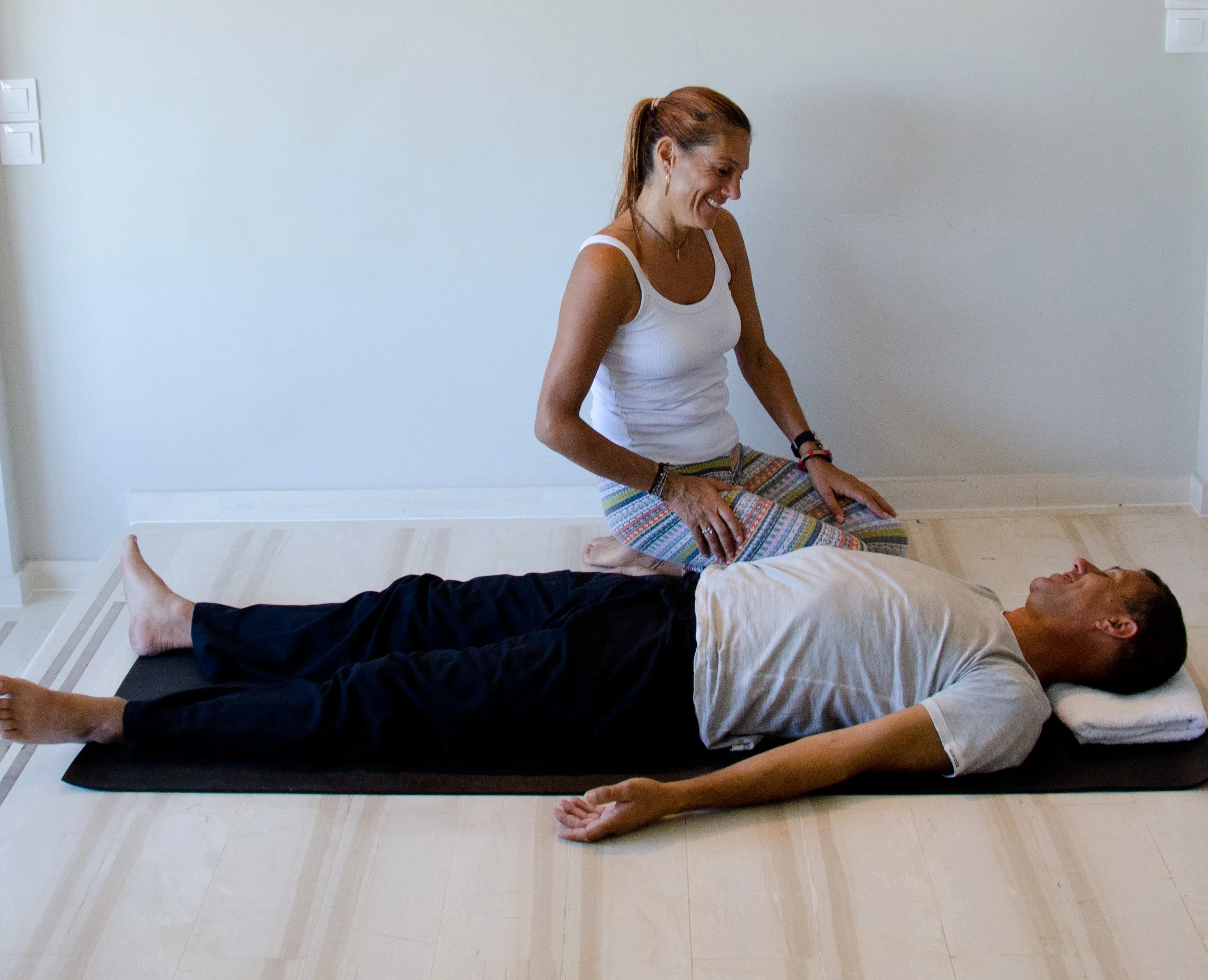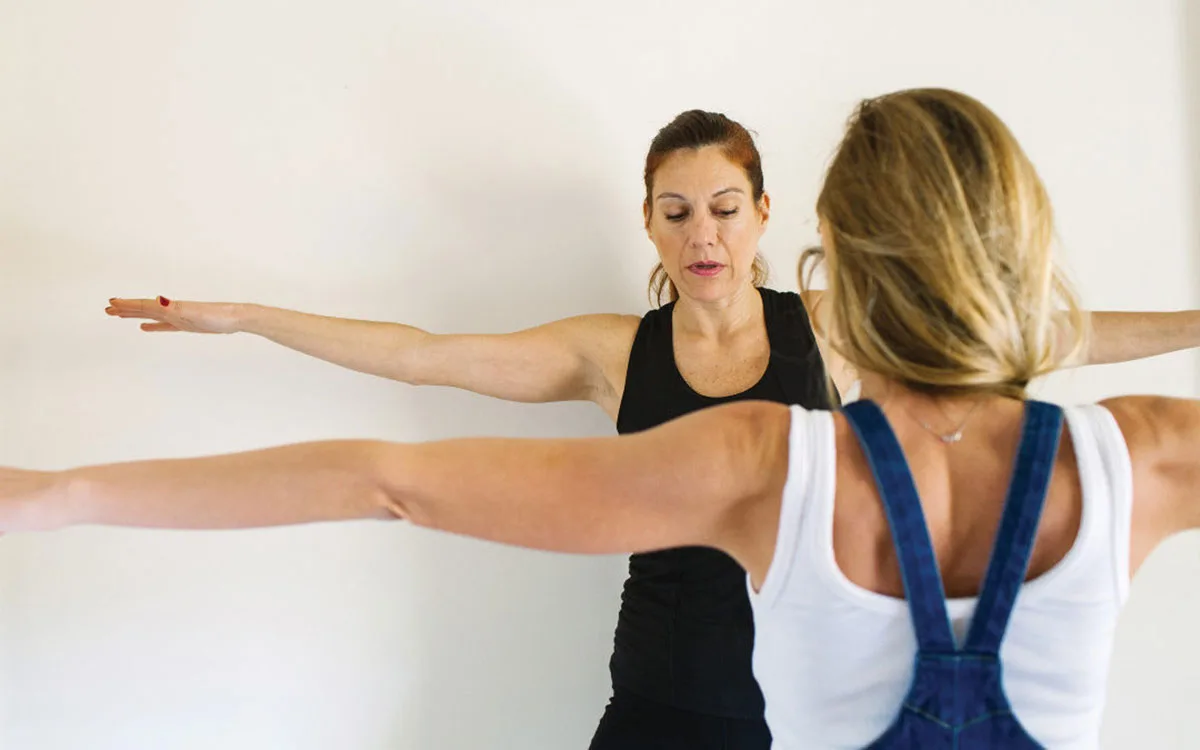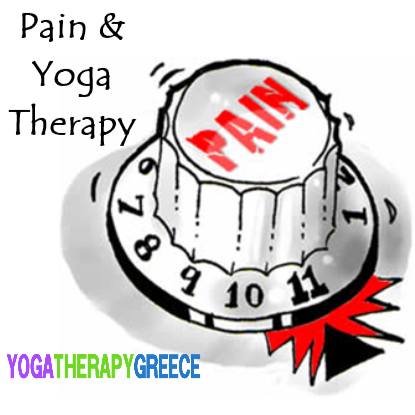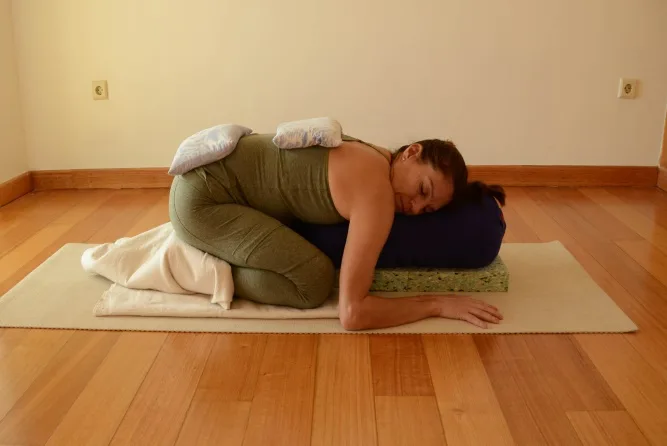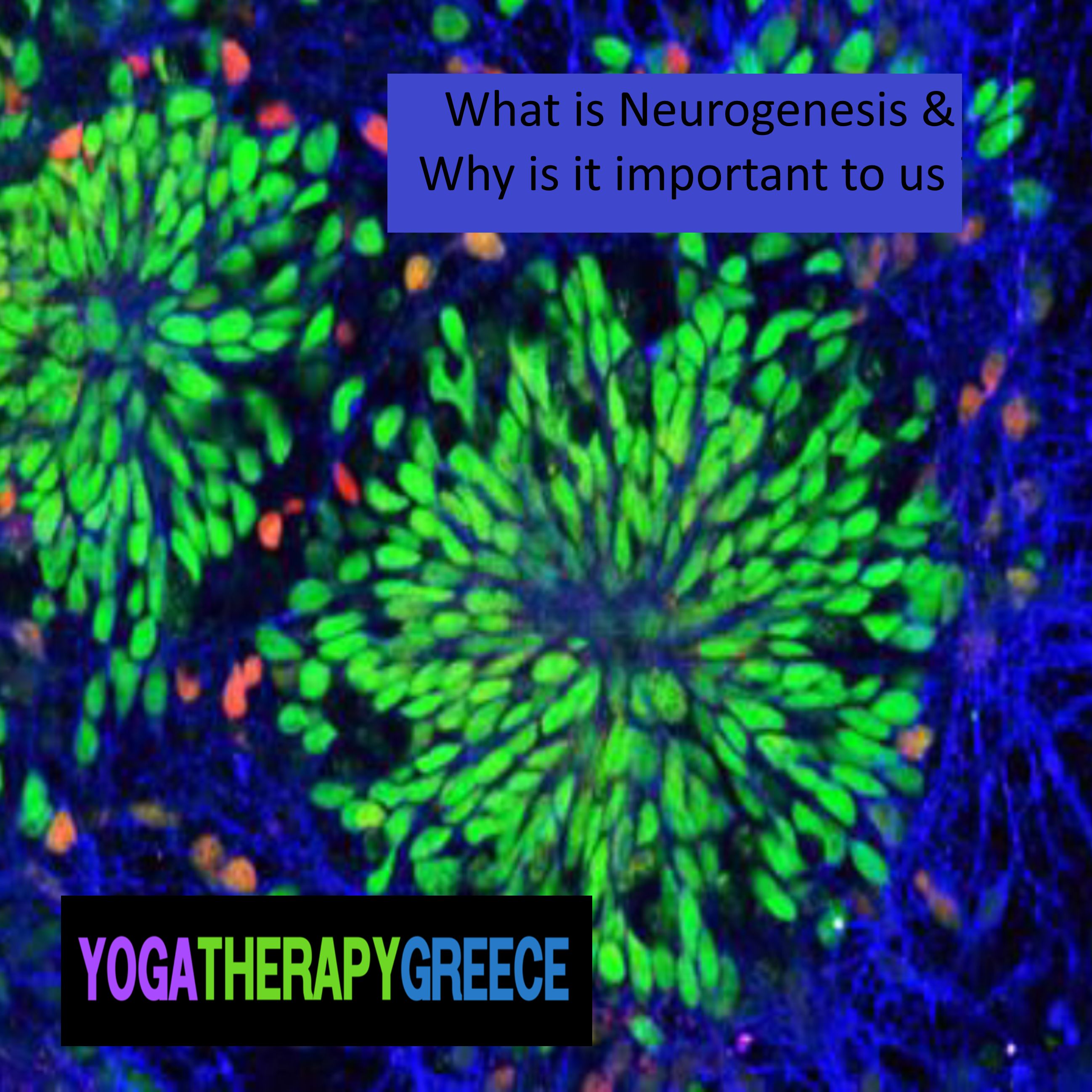Research on Benefits of Yoga in Breast Cancer Patients

THE EFFECTS OF YOGA PRACTIES ON BREAST CANCER PATIENTS
By EVI DIMITRIADOU, CERTIFIED YOGA THERAPIST, RYT-500
Through this Research Article Review I would like to share the effects of yoga practices primarily on physical health such as immunity, inflammation and secondarily on musculoskeletal symptoms, fatigue and vitality in Breast Cancer Survivors (people who have concluded their treatment) but also in Breast Cancer Patients (people who are in treatment either operation or hormone therapies).
The Search Process:
My literature research was through PubMed, although initially through Google scholar that led me to 10 databases such as US National Library of Medicine of the National Institutes of Health, to NCBI National Center for Biotechnology Information, to US Journal of Clinical Oncology, to International Journal of Yoga, to US Department of Human & Health Services, to Wiley online library, to Evidence-Based Complementary and Alternative Medicine (Hindawi), to Elsevier, to SageJournals, etc.
I used the keywords “yoga for cancer”, “yoga effects on cancer”, “yoga effects on immunity of cancer survivors”, “yoga impact on physical health in cancer patients”. The vast majority of the Research articles I have found were about Breast Cancer Patients or Survivors.
I found about twenty articles regarding the effects of Yoga on the symptoms of Cancer and Cancer Treatments like fatigue, insomnia, depression and anxiety. I found around ten Research articles and Meta Analyses on the effects of yoga on the physical health such as immunity, inflammation and musculoskeletal issues in Cancer patients and survivors. In most of them I could only read the very interesting abstracts but not the full articles unless I purchased the Research Articles as in the cases of Yoga reduces inflammatory signaling in fatigued breast cancer survivors, A randomized controlled trial, A pilot study of yoga for breast cancer survivors, physical and psychological benefits and Effect of mindfulness based stress reduction on immune function, quality of life and coping in women newly diagnosed with early stage breast cancer.
The Research articles I chose were the ones I could have free access to, they were using quite big samples, were in English, had Randomized Control Groups and were focusing on the effects of Yoga primarily in immunity, inflammation and physical health symptoms in 4 different Breast Cancer cases, that of survivors, that of early stage, that of metastatic cancer and that of treated with hormonal therapies.
The 4 articles I chose are the Yoga’s Impact on Inflammation, Mood, and Fatigue in Breast Cancer Survivors conducted by Ohio University and published in the American Society Journal of Clinical Oncology in 2014, the Influence of yoga on mood states, distress, quality of life and immune outcomes in early stage breast cancer patients undergoing surgery, conducted in a cancer care center in Bangalore and published in International Journal of Yoga in 2008, the Effect of Yoga on Sleep Quality and Neuroendocrine Immune Response in Metastatic Breast Cancer Patients, conducted in a cancer center in Bengaluru and published in Indian Journal of Palliative Care in 2017 and The effect of YOCAS©® yoga for musculoskeletal symptoms among breast cancer survivors on hormonal therapy conducted by the University of Rochester Medical Center and published in NCBI under Breast Cancer Research and Treatment in 2015.
Through the first article Yoga’s Impact on Inflammation, Mood, and Fatigue in Breast Cancer Survivors we can see the positive effects of yoga on Breast cancer survivors, women who had concluded their therapies either radio, chemo or operation.
According to previous researches, cancer survivors’ average cardio respiratory fitness is consistently approximately 30% lower than that of their sedentary age mates without a cancer history, up to 60% of cancer survivors report sleep problems during survivorship (three times more from adults without a cancer history), and although regular exercise reduces fatigue as well as inflammation, fatigue and pain often limit survivors’ physical activity.
Through this study researchers tried to see the effect of yoga on inflammation (measuring the pro-inflammatory cytokines), on vitality, on quality of sleep, on depression and on anxiety.
The yoga intervention took place with 100 participants for 12 weeks, 90 minutes twice a week with the instructors while a home practice was highly encouraged. The average daily home practice duration was 25 minutes. After the final assessments the yoga intervention was given to the control group consisting of 100 women also. 19 people in total dropped out from both groups.
I was glad to see the whole 24 sessions – 12 weeks protocol of the Yoga intervention, designed by Marcia Miller, since it was included in the Research article. It consisted of breathing techniques like nadhi sodhana, ujaee and three parts breathing plus supported postures and simple & easy to do movements such as pavamuktasana, supta padangustasana, active setu banda sarvangasana, jathara parivartanasana, vajrasana, balasana, janu sirsasana and pashimottansana on floor or on chair, marjariasana, bhujangasana, adho mukha svanasana, chaturanga dandasana at wall, prasarita padottanasana, tadasana, chest opening standing, seated twist, savasana, supta badha konasana, viparita karani and supported setu banda sarvangasana.
Although the depressive symptoms were not significantly different between groups, the other results were more promising. Immediately post-treatment fatigue was not lower (P.05) but vitality was higher (P.01) in the yoga group compared with the control group. At 3 months post-treatment, fatigue was lower in the yoga group (P .002), vitality was higher (P.01), and IL-6 (P.027), TNF (P.027), and IL-1 (P .037) were lower for yoga participants compared with the control group.
The most substantial conclusions of this study were that 3 months after the yoga intervention there was a decrease in production of pro-inflammatory cytokines such as interleukin-6 (IL-6), tumor necrosis factor alpha (TNF), and interleukin-1 in Breast Cancer Survivors, (Cytokines are Cell communication molecules that are secreted in response to external stimuli and they are involved in the amplification of inflammatory reactions).
Last but not least, a 10 minute-per-day increase in yoga practice was associated with an immediate increase in vitality and even bigger increase at 3 months post-treatment as well as a 5% decrease in the IL-6 and an 8% decrease in the IL-1.
The improved sleep reported by yoga group participants may have contributed to the positive changes.
The only limitation I found in this study was the fact that yoga intervention group was not compared to a group that had another body-mind practice.
Through the second research article Influence of yoga on mood states, distress, quality of life and immune outcomes in early stage breast cancer patients undergoing surgery we see the symptoms of cancer patients undergoing surgery and the effects of yoga breathing and relaxation practices on these symptoms and mostly on immunity measuring T lymphocytes and Immunoglobulin.
All the Cancer patients going through surgery have a lot of stress. This preoperative distress shown by elevations in plasma levels of epinephrine and cortisol, has been found to be related to longer hospital stays, delayed recovery, more postoperative complications, pain, increased need for medications, delayed wound repair and postoperative infections since they impair local and systemic immune responses, suppressing NK cell activity and cell counts. This immune suppression following surgery in cancer patients has also been implicated in the promotion of metastasis. Also, the tumor load is directly related to the serum IgA levels in breast cancer patients. So, the importance of stress reduction before and after stressful encounters is of vital importance
Based on these previous researches findings, the researchers tried to see the effects of yoga focusing on stress reduction on anxiety, depression, T lymphocytes and immunoglobulins on breast cancer patients following surgery.
Out of 98 patients, 19 dropped out. Out of 69 patients 36 made the control group.
The yoga intervention was an integrated yoga program that consisted of breathing techniques and relaxation yoga techniques focusing on stress reduction and improvement in shoulder mobility and was given from an instructor next to the patient’s bed and at home as a personal practice while the control group was given supportive counseling and rehabilitation movements of the shoulders.
The yoga intervention was helpful in reducing anxiety and depression, in betterment of quality of life and symptoms but mostly in increasing the T lymphocytes % counts such as CD4, CD8 CD56 (NK=Natural Killer cells) and decreasing immunoglobulins (IgG, IgA and IgM). Most specifically, there was a significantly lower decrease in CD56 % and lower levels of serum IgA in the yoga group as compared to controls postoperatively. However, there was a significant decrease in CD4, CD8 and CD56 % in the control group alone following surgery.
Unfortunately neither the specific breathing nor the relaxation practices were specified in the Research article. Also, the fact that the duration of the study was only 4 weeks, are the limitations of this study. I would like to see a similar study of 3 months duration. I tried to come in contact with the researcher Dr. Nagarathna Raghuram through his email included in the article in order to find out more about the specific yoga intervention, but the communication was impossible since e-mails could not be sent for some reason.
Through the third article, the Effect of Yoga on Sleep Quality and Neuroendocrine Immune Response in Metastatic Breast Cancer Patients we see the effects of Yoga on perceived stress, sleep, diurnal cortisol, and natural killer (NK) cell counts in patients with metastatic cancer.
Metastatic breast cancer patients have to cope with uncertainty about their future which is known to cause severe stress. The treatment-related distress coupled with daily hassles is intense enough to cause elevated stress hormones such as cortisol and hypothalamo-pituitary axes deregulation. This chronic stress is known to impair sleep and circadian rhythms with many bad results such as exacerbated symptoms, fatigue and immunity suppression. So, with this study researchers tried to see the effect of yoga on cortisol and lymphocytes, stress and sleep.
Out of 91 patients, 45 received the Yoga Intervention while 46 belonging to the randomized control group received education and supportive therapy sessions. 18 dropped out and 15 refused to give saliva in post assessments, so 46 (25 having yoga and 21 being in the control group) contributed data on final analyses.
Out of 91 patients 45 received integrated yoga based stress reduction program at least two times a week for 12 weeks over a 3 months period. The sessions began with didactic lectures of 10 minutes, followed by a preparatory practice of 20 minutes with few easy yoga postures, breathing exercises (pranayama) and yogic relaxation. The subjects were then guided through any one of the following three meditation practices for next 30 min which included focusing awareness on sounds and chants from Vedic texts or breath awareness and impulses of touch emanating from palms and fingers while practicing yogic mudras, or a dynamic form of meditation (cyclic meditation) which involved practice with eyes closed of four yoga postures interspersed with relaxation while supine, thus achieving a combination of both “stimulating” and “calming,” practice. These sessions were followed by informal individual counseling sessions.
The subjects were also given booklets and instructions on these practices and were provided audiotapes of these practices for home practice. They were asked to maintain a diary noting their daily activity which was monitored on a day-to-day basis by their instructor who conducted weekly house visits.
The results suggested modulation of neuroendocrine responses and improvement in sleep in patients with advanced breast cancer following yoga intervention. Although there was no significant change within or between groups in absolute lymphocyte count, there was a significant decrease in symptom distress (91.3%, ES = 1.2), sleep parameters (111.4%, ES = 0.6), quality of life (20.3%, ES = 0.9), overall insomnia score and there was also a significant decrease in early morning salivary cortisol levels in the advanced breast cancer patients of the yoga group.
From the fourth article The effect of YOCAS©® yoga for musculoskeletal symptoms among breast cancer survivors on hormonal therapy we see other symptoms on physical health –mostly musculoskeletal – of Breast Cancer Patients undergoing hormonal therapies such as Aromatase Inhibitors [AI] or tamoxifen [TAM]) and the effects yoga in them.
Hormonal therapies, such as aromatase inhibitors (AI) and Tamoxifen, significantly increase disease-free survival and reduce the risk of recurrence in breast cancer patients. However, they have unpleasant side effects such as musculoskeletal symptoms (joint pain and stiffness), bone loss and menopausal symptoms which significantly impact treatment adherence and discontinuation rates.
Researches in non-cancer populations indicated yoga was effective at reducing arthritis pain, back pain, and carpal tunnel pain. One-arm trial found yoga reduced joint pain in women on AI, while another study demonstrated qualitative improvements in joint pain with the use of yoga while this first, according to the researchers, two-arm trial research, focused on the quantitative effect of yoga on musculoskeletal symptoms.
Participants were enrolled between 2 and 24 months post surgery, chemotherapy and/or radiation therapy. Out of the 167 Breast Cancer Patients undergoing hormone therapy for 4 weeks 75 women received yoga intervention while the control group of 92 women received the standard care. The yoga intervention was given to them after the study.
The brief community-based yoga intervention utilized the UR Yoga for Cancer Survivors (YOCAS©®) program consisting of breathing exercises, 18 gentle Hatha and restorative yoga postures and meditation. The intervention was delivered in an instructor-taught, group format, twice a week for 75 min each time over 4 weeks for a total of eight sessions of yoga.
Out of the 167 Breast Cancer Patients, 95 were receiving AI (N = 95) and 72 TAM (N = 72) as hormone treatment. Women on AI were significantly older than women on Tamoxifen, had higher musculoskeletal symptoms such as general pain, muscle aches and total physical discomfort burden like feeling ill, needing help doing usual activities and a feeling of heaviness in the head and body than women on Tamoxifen. AI users also had significantly lower physical sub scores on both the MFSISF and FACIT-F than Tamoxifen users.
Among all breast cancer survivors on hormonal therapy, participants in the yoga group demonstrated greater reductions in musculoskeletal symptoms such as general body pain (yoga = 88.0 % vs. control 56.7 %;), muscle aches (yoga = 60.4 % vs. control 51.4 %; P = 0.35) and total physical discomfort from pre-to post-intervention than the control group. There was also a significant improvement in the FACIT physical sub score (Functional Assessment of Chronic Illness Therapy) (yoga = 78.9 % vs. control 60.0 %; P = 0.01) and a significant trend toward improvement in the MFSI physical sub score (Multidimensional Fatigue Symptom Inventory-Short Form) (yoga = 66.2 % vs. control 52.9 %; P = 0.09).
Since the a priori aim in the study was not to examine the effect of yoga of musculoskeletal symptoms in breast cancer survivors on endocrine therapy but the effect of yoga on sleep quality in all cancer survivors, the questionnaires designed to specifically measure musculoskeletal symptoms, such as the brief pain inventory or Health Assessment Questionnaire II, were not used in this study. I consider this and the limited time of the study (4 weeks only) the biggest limitations of the study.
Also the fact that I could not see the actual program of Yoga for Cancer Survivors (YOCAS©®) was a significant drawback of the research article.
I would like to see clinical trials whose primary hypothesis focuses on musculoskeletal symptoms such as arthralgias and myalgias on Cancer Patients taking place for at least 3 months in even bigger samples.
So, through these four Research articles Yoga’s Impact on Inflammation, Mood, and Fatigue in Breast Cancer Survivors , Influence of yoga on mood states, distress, quality of life and immune outcomes in early stage breast cancer patients undergoing surgery, the Effect of Yoga on Sleep Quality and Neuroendocrine Immune Response in Metastatic Breast Cancer Patients and The effect of YOCAS©® yoga for musculoskeletal symptoms among breast cancer survivors on hormonal therapy we gain a broad spectrum of the effects of yoga on physical health such as immunity, inflammation and musculoskeletal issues but also on psychological health such as fatigue, vitality, depression, anxiety, insomnia and quality of sleep.
The most important thing that became so clear from this small research review was that stress, measured by stress hormones such as increased cortisol and epinephrine, strongly represses the immunity measured by a decrease of T lymphocytes and enhances the inflammation measured in an increase of immunoglobulin.
Stress quite often leads to bad quality of sleep and insomnia that have been related to poor NK cell function, higher morning cortisol levels and abnormal diurnal rhythms in breast cancer patients. Improving quality of sleep and restoring the normal sleep rhythms are important to preserve immune homeostasis and quality of life.
Yoga is a psychosomatic intervention that provides graded exercise which can be tailored for individuals and the postures can be modified to accommodate functional limitations. Yoga addressing the body and the mind, has positive effects on stress and on sleep, this as a result has further positive effects on physical and psychological health. The improvements seen with the interventions suggest that yoga could be used to manage stress and sleep disorders in cancer patients having positive results in immunity.
In all four Yoga interventions the focus was to reduce the stress by breathing, relaxation practices and simple and easy to do yoga postures/movements that release tension and enhance mobility and not the impressive yoga postures that are highly promoted in the media, leading many people in need far away from it.
All four interventions were highly encouraging specific personal practice at home.
I think this the essence of the therapeutic approach of Yoga, to empower people to cope with their stress and limitations even in the most challenging conditions.
The effects of Yoga were positive. Still, because of the small number of studies having been conducted and the methodological limitations, the results should be regarded as preliminary and treated with caution. Future research should focus on higher-quality trials with larger sample sizes in order to provide more precise estimates of the effects of yoga as a complimentary treatment.


